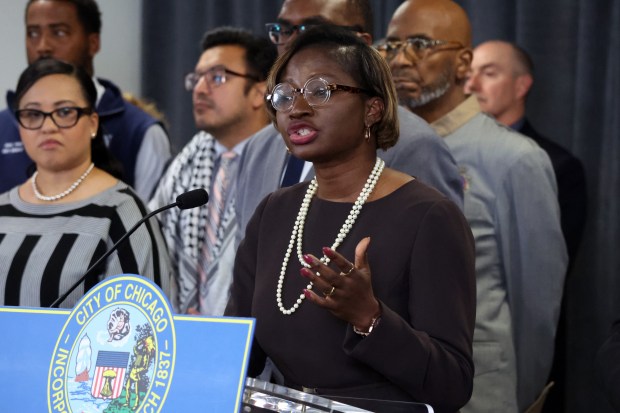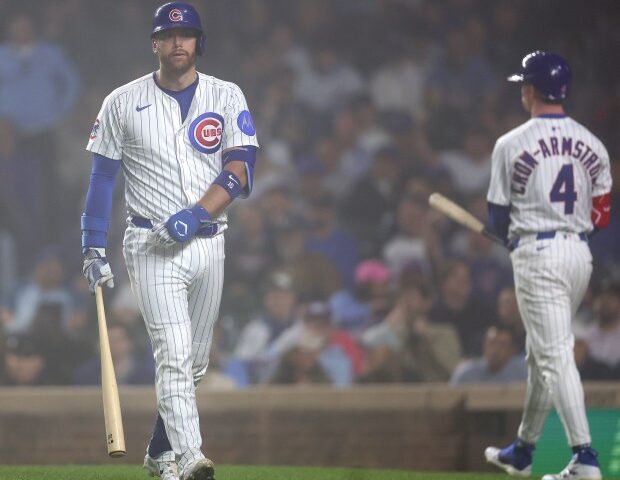Of nearly 22,000 Chicago Public Schools students without stable housing as of the end of February, less than half met all CPS immunization requirements, according to a report provided to the Tribune Thursday by the Chicago Coalition for the Homeless. The report covers various characteristics of students in temporary living situations and is created by CPS monthly, according to the coalition, which provides homeless youth legal aid and other resources.
“If a family is experiencing homelessness because of a disaster, they might not have those documents, so they’re allowed to be enrolled without those documents being needed,” said Alyssa Phillips, education attorney with the Chicago Coalition for the Homeless, of a provision under the federal McKinney-Vento Act that allows students without stable housing to register for school before meeting immunization requirements.
“However, the school is supposed to help the families access those documents and all the needed requirements,” she added.
School registration should go hand-in-hand with facilitating access to immunizations said Dr. Olusimbo Ige, Chicago Department of Public Health Commissioner. “We want people to be enrolled in school and we want to give them the opportunity to settle in while also simultaneously assessing their vaccination needs and then connecting them to meet those needs,” Ige said as the agency fielded questions on social media Wednesday.
Generated a week before public health officials announced the first measles case in Chicago in five years, the report sheds light on the scope of students who may have been at high-risk of infection as of February 29. Since then, CPS has announced that two elementary school students are among the 12 cases confirmed by the Chicago Department of Public Health as of Thursday night.
Phillips said it’s important to note that the vast majority of students in temporary living situations don’t reside in high-risk congregate facilities but rather with family or friends.
Nearly 6,800 students were living in shelters as of the end of February, according to the report. It’s possible that a student could have some vaccinations, including for measles, but not be in immunization compliance because they do not have other required vaccinations, she added.
State law typically requires all students to receive MMR (Measles, Mumps, Rubella) immunizations, unless a parent or guardian submits either proof that the child previously contracted measles or a medical or religious exemption. Less than 1% of students had a religious or medical exemption as of November, the district said.
CPS said school nurses and STLS (Students in Temporary Living Situations) Liaisons work with families of STLS to help them come into compliance with vaccination requirements.
But as the number of students in temporary living situations has more than doubled in the past year, Phillips said the coalition has been advocating for additional liaisons to ensure families are quickly provided the necessary access. District records as of December 31 also show school nurses are stretched thin. Across more than 600 schools, CPS had 192 school nurses, of whom only one was assigned a specific school as of the district’s most recent employee roster.
In an emailed statement Thursday, the district noted schools often work directly with local healthcare providers and mobile units. “CPS provides multiple opportunities for vaccination as well as resources for community-based services and we work closely with families to help them be up-to-date on all vaccinations,” a spokesperson said.
“The health, safety, and well-being of our students and staff is a top priority and that is why Chicago Public Schools continues to work closely with our City partners, including the Chicago Department of Public Health (CDPH) to respond to respond to any measles cases as well as any unvaccinated students,” CPS said.
Scope of exclusions from school is unclear
The two CPS students with confirmed cases attend Philip D. Armour Elementary in Bridgeport and Cooper Dual Language Academy in the Lower West Side. Both were at school during the contagious period, CPS said.
Staff and families who’ve been vaccinated can feel confident attending school as normal, even if they’ve been exposed, CPS CEO Pedro Martinez wrote in a letter to families Wednesday. Students who aren’t protected through either vaccination or previously contracting measles have been advised to stay home for a 21-day quarantine period beginning the last day of potential exposure, the district said.
CPS has not provided the total number of students excluded from school as of Friday, with the district saying Wednesday that it was still verifying the data. But as children represent half of the 12 cases confirmed as of Thursday – and half of the 1,900 residents of the Lower West Side shelter for asylum seekers where the majority of cases have been confirmed – youth are likely among the 90 people being monitored for exposure by the Cook County Department of Public Health as of Thursday.
Ige, the Chicago Department of Public Health Commissioner, told the Tribune Tuesday that the agency believes the first child to catch measles in the shelter caught the disease in Chicago, which “is really important to note so that people are not stigmatizing people.”
Illinois is among 17 states as of Thursday to report measles cases to the Centers for Disease Control since the start of the year. The first case reported in Chicago, involving an adult on the Northwest side, was unrelated to the now-quarantined shelter.
The Armour elementary school student and another child, not yet school age, with confirmed cases were in good condition as of Monday. CPS did not immediately provide the condition of the Cooper elementary school student.
‘It’s not necessarily somebody’s fault’
In his letter to parents Wednesday, Martinez addressed the “unsettling” outbreak. “I want to assure our CPS community that our schools are safe,” he wrote, noting that, unlike the onset of the novel COVID-19 pandemic in which no one had immunity, around 90% of Chicago residents have received the MMR vaccine.
Outbreaks have emerged where vaccination rates have fallen, according to the American Academy of Pediatrics.
In Chicago, Dr. Anita Chandra-Puri, a practicing pediatrician with Northwestern Medicine and spokesperson for the academy, said she thinks the mounting cases have more to do with lacking access to immunizations than refusal.
“It’s not necessarily somebody’s fault,” she said. “It’s not something that somebody expected or wanted to have happen to them. They’re equally probably scared and nervous about contracting an illness that can be very devastating,” she said.
“It’s just that now we’re in the situation where if they weren’t vaccinated because they didn’t have access to not just the vaccine but reliable health care or to trustable health care…it’s an overwhelming situation,” she said of the resources needed to contain an outbreak.
Bridget Heroff, president of the Illinois Association of School Nurses said that on the other side of the COVID-19 pandemic, she’s disappointed there aren’t full-time nurses in every CPS school, where they could readily address gaps in access.
“They become a person that families can turn to as a trusted medical professional, especially since they’re servicing the students every single day,” Heroff said, adding that school nurses are often the only healthcare professional disadvantaged students see for years at a time.
“We may be able to have some of those harder conversations with families that unknown healthcare professionals possibly wouldn’t be able to have.”
CPS families that need assistance in accessing care, including routine vaccinations, can call the Healthy CPS Hotline at 773-553-KIDS (5437). For more information on measles and vaccines, the American Academy of Pediatrics offers a guide for parents in English and the Centers for Disease Control provides multiple resources en español.




